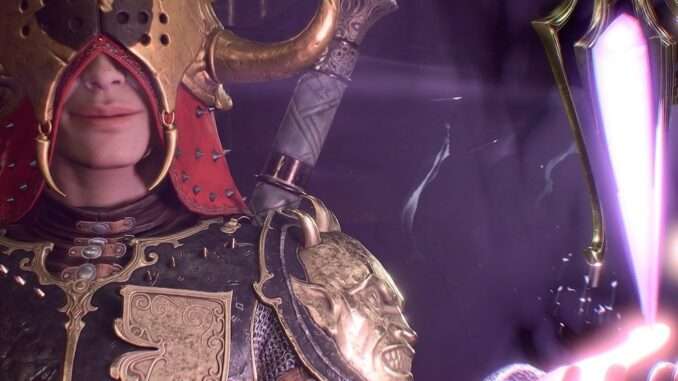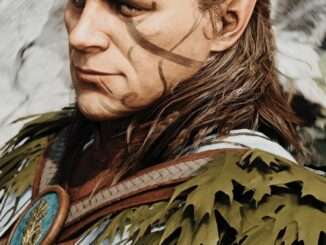
Looking at exactly how ability points work in game. How they scale with skill and attack checks and video also included.
Contents
Introduction
Сrеdit gоеs to Gaming Existence !
Welcome to my guide on understanding exactly how your ability points will provide modifier bonuses for your skill checks, attacks and more.
There is also a fully animated video that you can view here if you prefer to watch rather than read:
Ability Points Overview
All characters whether you choose a custom character or a pre-built one come with ability points spread across different attributes.
They represent how good or bad you are at performing in certain areas, such as if you are strong, hardy, wise or charismatic.
The class you choose and how you want to play will be heavily impacted by the numbers you have on your abilities.
The higher the number the better you will perform in that area. But the game mechanics of this work in multiples of two, called modifiers.
An attribute stat of 12 provides a +1 modifier bonus, 14 +2 and so on with 20 being +5.

Our level 1 characters are able to start with a single 17, providing +3, as this bonus rounds down to the closest even number.
10 Is neutral with +0 and going below 10 provides negatives to the number. 9-8 being -1 7-6 -2 and so on.

D&D is based on a D20 system, where you roll a 20-sided dice to determine if you succeed or fail at whatever you are trying to do.
Your abilities will provide those modifier bonuses or minuses to these rolls, and this is why they are called modifiers, because they modify the final result after we roll the dice.

Skill Check Examples
Here is a strength check example from very early on in the game. My rogue gnome only has 8 strength, which is a minus one modifier. And this is why we have -1 to this strength check.

When you select a check, the game then reveals the difficulty, in this case 7.

I will be rolling a D20 with minus 1 from my strength modifier and need to match or beat 7.
Meaning I must roll at least an 8 or higher.
But. My sneaky Gnome rogue might not be the best at using the strength attribute, but dexterity on the other hand I excel at.
And here we can see I have a different skill check option. Because I’m a rogue the game has unlocked a different option. Instead of strength I can use a sleight of hand skill check option.

When we create our characters, we can choose skills that we can be proficient in, when gaining new levels or multiclassing into different classes we may gain proficiency in other areas also.
Skill proficiency is an additional modifier to our final result, once again providing boosting or reducing the final result.

Skills scale with certain attributes such as strength or in this case with sleight hand. It scales with dexterity.
Meaning we don’t just get bonuses from being proficient in the skill, but we also add our dexterity modifier bonus.
And this is why we don’t just gain a +3 modifier from dexterity. But we also get additional 2 because we are proficient and an additional 2 because we have expertise in sleight of hand for a +7 bonus.

When creating your character, it is normally a good idea to select skill proficiencies that scale with your best stats.
With this rogue character, stealth and sleight of hand scales with dexterity, meaning the higher my dexterity goes up with ever higher modifier bonuses, the more powerful the skills will be in the future.

Attack Examples
Here we have Lae’zel wielding a longsword. Most melee weapons scale with strength, but not all of them, something we will examine next.
In this case we have 17 strength for a +3 modifier bonus. But we also have a +2 proficiency, which is from our character level and being skilled at wielding this sword.

As your character increases in level your proficiency bonus will increase, also keep an eye out for not being proficient when using certain weapons or armour, as you will get negative effects.

But here we have +5 to our dice roll and it functions just like our difficulty check from before. But now the difficulty we face is the targets armour class.
Our pesky Hellboar here has an armour class of 11. And so that is our difficulty check to succeed in hitting. We will roll a D20, add our +5, meaning as long as we roll a 6 or more, we will hit and damage our boar.

Our damage also scales with strength in this example. The sword deals 1d10 that’s a ten-sided dice so a random number between 1 and ten. But with +3 guaranteed damage from our strength modifier.

Now let’s look at this with our Rogue Gnome.
We are using a weapon that has finesse. On PC you can press T, on controller press down of the D-pad, with an item or enemy selected. It will show you additional details.

And finesse as we can see here scales with dexterity. Meaning everything we just looked with Lae’zel and strength, is handily replaced with dexterity.
We have 17 dexterity for +3, the same proficiency bonus of +2 for being level 1 and thus the same +5 to hit the boar.
The scimitar only deals 1d6 a standard six sided dice for damage because it’s smaller than the longsword but the +3 damage bonus comes from our dexterity instead of strength is still there for guaranteed damage.

And we can see just how important the ability points are and putting your points in the right attributes for the character and class you choose.
Dropping our dexterity on our Gnome to 15 or 14 will make it one harder to hit and we will deal one less damage, whereas of course boosting it higher will increase our chances of hitting, and give us more consistent damage. Plus less chance of dealing no damage at all because of a miss.

Let’s have one final example and use a spell caster. Here we have a Sorcerer who scales with Charisma, but a Wizard would be the same, they just scale with intelligence instead.
It’s a bit harder to get the accurate information with the spell caster in game, but once again pressing T or down on the controller D-pad we can examine the attack roll.

We have the now familiar +5 as we have seen in our two other examples. And you guessed it, it’s because we have 17 charisma, for a +3 bonus, and we have our +2 proficiency from our class level for +5.

One thing to keep in mind with spells is that the damage in the majority of cases will not scale with your primary attribute stat. Our Fire bolt will deal 1D10 damage only. It won’t gain a bonus from our charisma modifier.
The primary ability stat for casters will make it harder for enemies to save against spells like hold person or even to save against something like fireball for half damage.

Attribute Nuances
Strength will also impact your inventory carrying capacity. And the ability to pick and move objects in the game world.
It will also impact you jump distance increasing it, which can be important in combat situations or navigating the world.

Dexterity will also increase your armour class for each bonus it provides. This modifier can be capped or entirely negated by some armour so keep this in mind.

Constitution will provide an additional hit point per modifier point per level. 12 constitution is a +1 bonus, so our level 10 character would get ten additional hit points.

If we have 18 constitution and a +4 bonus, that’s an additional 40 hit points!

Intelligence is mainly used for certain spell casting classes as the primary scaling stat. It does also impact certain skill checks and other exotic actions that you can find on the wiki.

Wisdom is the primary stat for certain spellcasters such as clerics and druids.
But one of the more important skill checks that it scales with is perception, this skill can be very important for finding traps and hidden items in the game.
I recommend that at least one of the characters in your party has a moderate to high wisdom stat with proficiency in perception checks.

Charisma is used as the primary stat for spell casters such as Sorcerers and Bards. It is also used for persuasion and intimidation checks that can often resolve situations without the need to fight. And it will impact vendor prices.
And all of these will impact your saving throws against enemy spells and abilities, but once again, more on that in another video/guide.
Character Creation
You can choose a pre-made character like Gale if you want to be a wizard. Don’t worry, we can still change his abilities to min max if we want to and the origin character skills to some extent but we can’t change our background so we are stuck with some proficiencies.
We can’t change race or appearance either.
But we can play through the game as Gale if we so wish. Making the choices we want to do, just with Gales’ conscience and desires to contend with as we do!
Or we can create our own custom character, and we have all the freedom to change appearance, abilities, skills and so on.
Races in Baldurs Gate 3 has been shifted more into the role play category rather than min max place like in other games such as Neverwinter nights.
This is because instead of all elves getting +2 dexterity or all half-orcs getting +2 strength. Each character no matter of race will get to assign a +2 to one ability and a +1 to another ability.

It’s not a huge issue dropping certain stats to 8. Yes you get a -1 on those skills checks and it can impact some saving throws, but if it allows you to boost other more important stats it can be a good option.
Dropping intelligence under 10 on characters might give you negatives for the skill checks they perform requiring intelligence, but if you have the wizard Gale for example in your group.
He could be the one who performs those tests with his big intelligence modifier bonus. And similar goes for other stats and skill proficiency. You will end up with 4 characters to use with their own strengths and weaknesses to try and have as much of a balanced party as possible, its not all on one character.
And don’t worry of you mess any of this up! Very early on you can change your class, attributes and skills so don’t get massively hung up on this. You can also change your appearance in game.
You can also adjust the difficulty mid campaign, so if you start to min max and feel overpowered, you can put the difficulty up to tactician if you fancy a bit more of a challenge at any point.





Be the first to comment